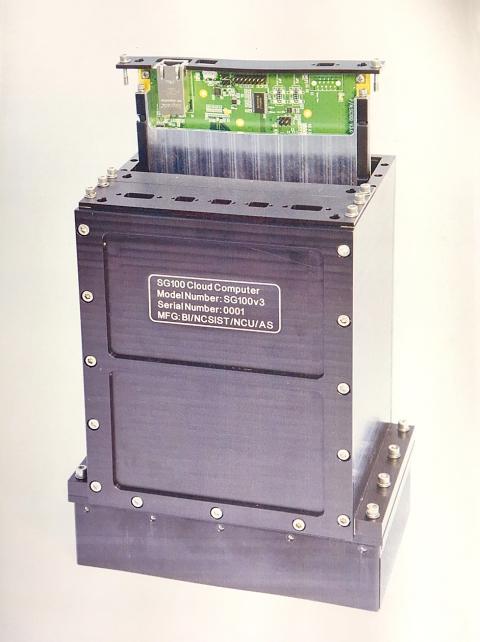A computer designed in Taiwan was sent to the International Space Station (ISS) for testing for a long-term contract, a Chungshan Institute of Science and Technology official has confirmed.
The SG100 Cloud Computer was designed by the institute after NASA opened the contract for the computer to worldwide bids, and it is capable of performing cloud-based computations and upgrading itself during space missions, the official said.
NASA selected the computer for its OA-7 mission after it passed the US space agency’s evaluations with a perfect score, the official added.

Photo courtesy of the Chungshan Institute of Science and Technology
NASA launched the OA-7 mission on April 18 to supply the space station with an Orbital ATK rocket, and the SG100’s components were included in the shipment for assembly at the station.
If the SG100 passes a six-month field trial, the institute will be contracted by NASA to design its next-generation space mission computers, the official said.
The SG100 Cloud Computer program was a joint effort by the institute, Academia Sinica and National Central University.
The Institute of Nuclear Energy Research and the Chang Gung Memorial Hospital’s Lin-kuo Branch allowed the design team to use their particle accelerator to test the computer’s performance in space-like conditions.
“Data generated by planning, design, analysis and simulation tasks involved in the process had all been evaluated by NASA experts... The final product was then subjected to NASA’s rigorous environmental testing, which the SG100 passed flawlessly,” the official said.
The design team worked with NASA on the computer used by the space station’s alpha magnetic spectrometer (AMS), a computer that has been in use at the station since 2001.
The AMS project was headed by Nobel laureate Samuel Ting, a Taiwanese-American physicist, who was also involved in the development of the SG100.
The OA-7 mission is to involve four key experiments, including testing of the SG100.
The institute last year announced that it was building a lunar lander for NASA’s Resource Prospector mission, which aims to be the first mining expedition on the moon in the early 2020s.
The lunar lander is expected to be completed by next year and the mission is expected to be launched in the early 2020s — if it is given the green light, institute officials said in July last year.

NATIONAL SECURITY THREAT: An official said that Guan Guan’s comments had gone beyond the threshold of free speech, as she advocated for the destruction of the ROC China-born media influencer Guan Guan’s (關關) residency permit has been revoked for repeatedly posting pro-China content that threatens national security, the National Immigration Agency said yesterday. Guan Guan has said many controversial things in her videos posted to Douyin (抖音), including “the red flag will soon be painted all over Taiwan” and “Taiwan is an inseparable part of China,” while expressing hope for expedited “reunification.” The agency received multiple reports alleging that Guan Guan had advocated for armed reunification last year. After investigating, the agency last month issued a notice requiring her to appear and account for her actions. Guan Guan appeared as required,

A strong cold air mass is expected to arrive tonight, bringing a change in weather and a drop in temperature, the Central Weather Administration (CWA) said. The coldest time would be early on Thursday morning, with temperatures in some areas dipping as low as 8°C, it said. Daytime highs yesterday were 22°C to 24°C in northern and eastern Taiwan, and about 25°C to 28°C in the central and southern regions, it said. However, nighttime lows would dip to about 15°C to 16°C in central and northern Taiwan as well as the northeast, and 17°C to 19°C elsewhere, it said. Tropical Storm Nokaen, currently

‘NATO-PLUS’: ‘Our strategic partners in the Indo-Pacific are facing increasing aggression by the Chinese Communist Party,’ US Representative Rob Wittman said The US House of Representatives on Monday released its version of the Consolidated Appropriations Act, which includes US$1.15 billion to support security cooperation with Taiwan. The omnibus act, covering US$1.2 trillion of spending, allocates US$1 billion for the Taiwan Security Cooperation Initiative, as well as US$150 million for the replacement of defense articles and reimbursement of defense services provided to Taiwan. The fund allocations were based on the US National Defense Authorization Act for fiscal 2026 that was passed by the US Congress last month and authorized up to US$1 billion to the US Defense Security Cooperation Agency in support of the

PAPERS, PLEASE: The gang exploited the high value of the passports, selling them at inflated prices to Chinese buyers, who would treat them as ‘invisibility cloaks’ The Yilan District Court has handed four members of a syndicate prison terms ranging from one year and two months to two years and two months for their involvement in a scheme to purchase Taiwanese passports and resell them abroad at a massive markup. A Chinese human smuggling syndicate purchased Taiwanese passports through local criminal networks, exploiting the passports’ visa-free travel privileges to turn a profit of more than 20 times the original price, the court said. Such criminal organizations enable people to impersonate Taiwanese when entering and exiting Taiwan and other countries, undermining social order and the credibility of the nation’s